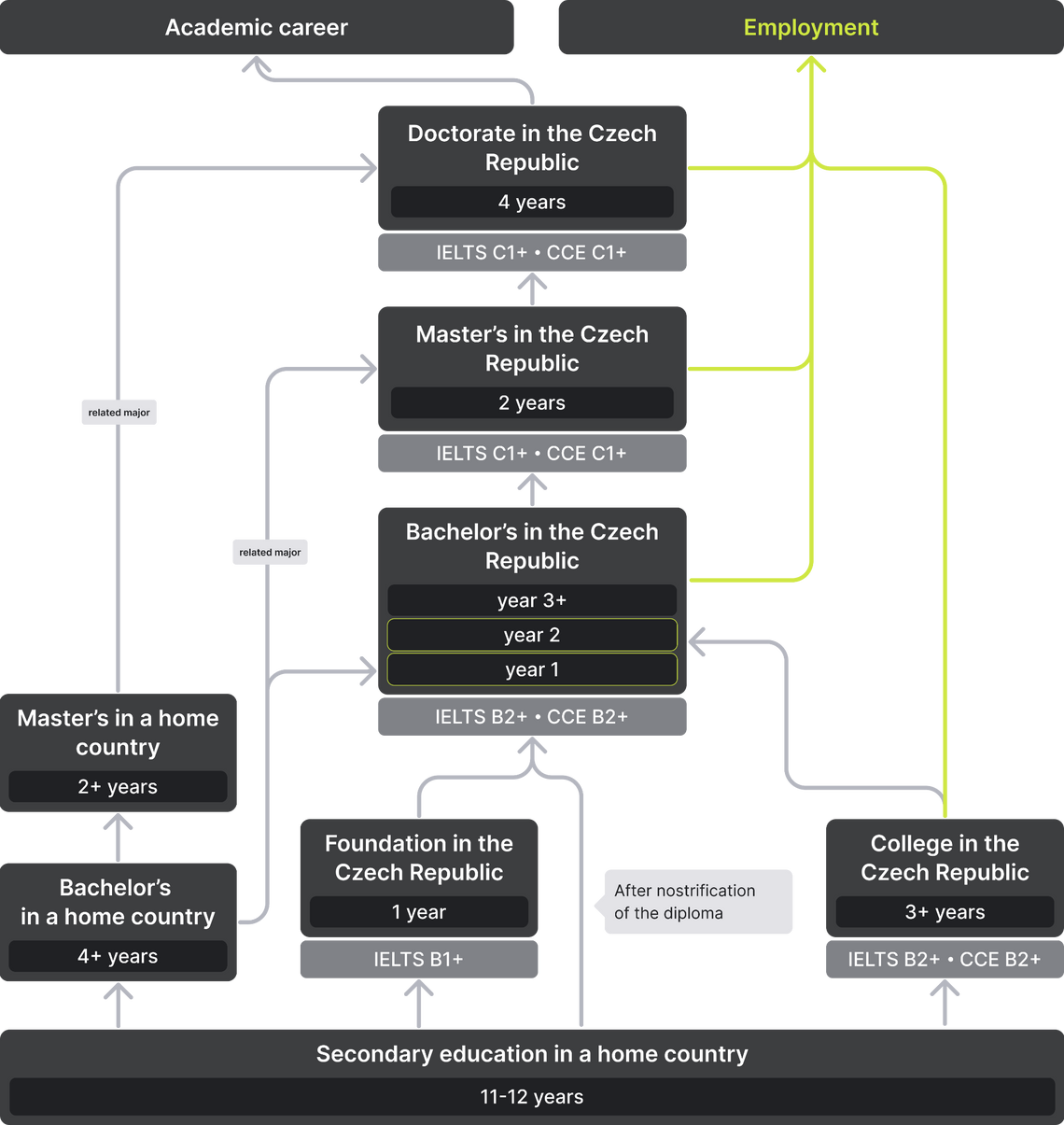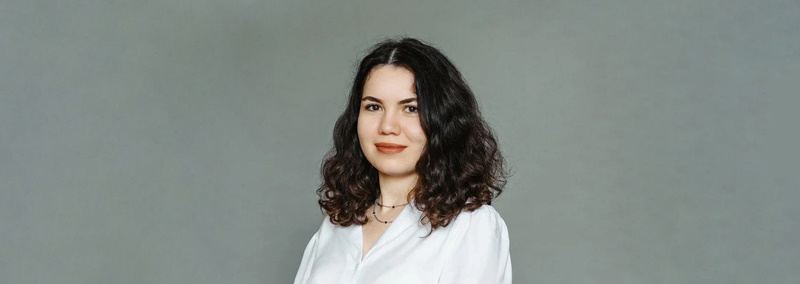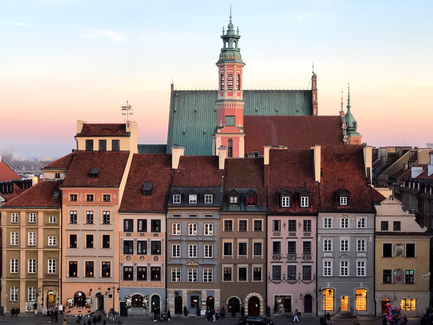
Secondary education in the Czech Republic
In the Czech Republic, education is compulsory for children of ages 6 to 15[1]: during this time, most children attend basic elementary school (základní škola). After the fifth grade, students can choose another educational institution to continue their studies. The high school is divided into two stages: the first is from grades 6 to 9, and the second one is optional and lasts another three years — from grades 10 to 13.
The academic year begins on September 1 and ends on August 31 of the following year.
In addition to the basic school, there are 4 more types of secondary educational institutions:
- General secondary schools (gymnázium) provide general academic preparation for further admission to the university. Duration of study may vary depending on the number of years spent in primary school: when entering after the fifth grade, education takes 8 years, after the seventh grade — 6 years, and after the ninth grade — 4 years. In the end, students pass the final exam (maturita). In total, about 20% of children attend such schools[2].
- Conservatories (konzervatoř) are similar to gymnasiums, but the training programs here focus on dancing, music and acting. Children come here after the 6th grade and study for 8 years in the dance department or 6 years in acting and music. At the end of the conservatory, two diplomas are issued: on graduating from high school (maturitní zkoušce) and on the corresponding arts education (absolutorium).
- Secondary technical schools (střední odborná škola — SOŠ) provide vocational education in 260 areas. About 40% of the time is devoted to general education subjects, and 60% to technical training[2]. Training lasts 4 years and also ends with a final exam (maturita), after which graduates can continue to study or find work.
- Secondary vocational schools (střední odborné učiliště — SOU) offer special vocational education, which takes from 1 year to 4 years — the longer the duration, the higher the qualification. In addition, graduates of short courses do not receive a high school diploma and, therefore, are not able to continue their studies. In total, there are 565 such institutions in the Czech Republic, and about 50% of children attend them[2].
Education in the Czech Republic is known to many foreign students as an alternative to a rather expensive education in other European countries. Czech universities are not inferior to their European colleagues in quality, or prestige and traditions. In addition, in the Czech Republic, you can go through the Foundation program, get an inexpensive MBA or spend several weeks at a language school studying Czech or English. Basically, the Czech Republic has many educational opportunities available to a variety of students — from high school graduates to well-established specialists.
Advantages of studying in the Czech Republic
- Tuition. Studying in the Czech language in CR public universities is free for both local and foreign students. Tuition fees in programs conducted in English range from 0 to 21,947 USD per year.
- Cost of living. Housing in the Czech Republic is relatively cheap compared to other European countries: a month of renting a one-room apartment in Prague costs on average 535 USD, while in London — 1,927 USD, in Paris — 964 USD, in Berlin — 856 USD. Household expenses range from 300 to 642 USD per month[3].
- Student life. In the ranking of the best student cities in the world according to QS, there are two Czech cities: Prague in 35th place and Brno in 60th[4]. Czech universities provide dormitories, help with employment, and offer medical care. The state also makes public transportation discounts for students[5].
Disadvantages of studying in the Czech Republic
- Entrance tests. Despite the fact that all public universities are subordinate to the Ministry of Education, Youth and Sports (Ministerstvo školství, mládeže a tělovýchovy), they still have a large share of freedom and autonomy. In this regard, each university has the right to set their own entrance examinations.
- Age restrictions. Education conducted in Czech at public universities is free and has no age restrictions. However, student privileges such as student discounts on health insurance[6] and public transport[7] do not apply to people over 26 years old.
Cost and structure of education in the Czech Republic
| Program | Min. age | Duration | Min. cost | Avg. cost | Min. language proficiency | Exams |
| Summer Camp | 7+ | 1–8 weeks | 236 USD/week | 1,606 USD/week | Elementary (A1) | - |
| Language Schools | 9+ | 1–12 weeks | 289 USD/week | 621 USD/week | Elementary (A1) | - |
| Elementary school | 6 | 6 years | Free | 14,453 USD/year | Intermediate (B1) | - |
| Secondary school | 12 | 6 years | Free | 14,453 USD/year | Intermediate (B1) | - |
| Foundation | 18+ | 1 year | 2,248 USD/year | 3,961 USD/year | Intermediate (B1) | IELTS / TOEFL |
| College | 18+ | 3-5 years | 107 USD/year | 214 USD/year | Intermediate (B1) | CCE / IELTS / TOEFL |
| Bachelor’s | 18+ | 3-4 years | Free | 3,747 USD/year | Intermediate (B1) | CCE / IELTS / TOEFL |
| MBA | 21+ | 1-3 years | Free | 13,383 USD/year | Upper-Intermediate (B2) | CCE / IELTS / TOEFL |
| Master’s | 21+ | 1-3 years | Free | 4,497 USD/year | Upper-Intermediate (B2) | CCE / IELTS / TOEFL |
| Doctoral | 22+ | 3-4 years | Free | 5,032 USD/year | Advanced (C1) | CCE / IELTS / TOEFL |
Higher education in the Czech Republic is represented by three types of educational institutions: universities provide academic training in the framework of bachelor’s, master’s and doctoral studies, colleges offer specialized vocational education, and conservatories are engaged in training in creative fields. The main language of instruction is Czech, but some universities have programs in English, Russian, French and German.
Additional сosts
| Expenses | Average Cost |
| Exams | 150 USD |
| Registration fee | 123 USD |
| Flight | 203 USD |
| Rent | 535 USD/month |
| Food | 407 USD/month |
| Insurance | 24 USD/month |
| Learning materials | Free or 236 USD/year |
The options for admission to Czech universities

Admission and requirements of Czech universities
Admission to most universities consists of three consecutive stages: sending an application, entrance exams and sending a package of application documents. Czech universities accept applications from January to March. In addition to filling out digital forms, some universities may ask you to complete an additional task, for example, provide a motivational letter or shoot a video. In April, the dates of entrance examinations are revealed — they are usually scheduled for May. Exams usually consist of oral and written parts. They test the knowledge of students in the chosen specialty and the level of knowledge of the Czech language.
Nostrification — Validation of foreign studies and degrees
The last stage is the submission of all necessary documents. This also includes the validation of a foreign degree or certificate of previous education[8]. The establishment which a student needs to address depends on the location of stay (for example, if a student is staying in Prague, the Prague City Hall will conduct nostrification). A complete list of organizations accredited for nostrification can be found here.
Documents required for validation
- Application;
- A notarized translation into Czech of a degree or certificate of previous education and transcript with grades;
- Confirmation of registration fee payment (123 USD)[9];
- Original passport;
- Confirmation of your stay in the Czech Republic.
Documents can be submitted in person, through an authorized representative or by mail (the latter option is not preferable by the Czechs[8]).
The result of verification can be a complete confirmation (or denial of confirmation) of the document or its partial recognition. In the second case, students may be asked to take the verification test[10], which consists of questions on subjects that are present in the Czech school curriculum but are not in the recognized certificate. Despite the fact that the test is conducted in Czech, a student can hire a translator, since language proficiency evaluation is not the point of the test.
Application documents for Czech universities
- Notarized translation into Czech of a document of previous education and transcript with grades;
- Notarized Czech translation of the birth certificate;
- Verified document of previous education;
- Copy of the passport;
- Health certificate;
- Motivation letter;
- English or Czech language certificate (some universities do not require a language certificate, preferring to conduct language testing on their own);
- Registration fee payment receipt (21-48 USD).

Foundation — Preparatory programs in the Czech Republic
Some universities in the Czech Republic offer annual foundation programs (přípravné kurzy), created specifically for international students who want to study in bachelor’s, master’s or doctoral programs, but do not meet the language requirements of the university. The curriculum may consist solely of classes in Czech, as well as additional subjects in the related subjects. Teaching is usually conducted in English, but some universities offer courses in, for example, Russian. An application is submitted online on the university website.
In addition to personal information, the following documents are required:
- Motivation letter (in Russian, Czech or English);
- Copy of the passport;
- Copy of the international passport (if any);
- Copy of a document of previous education (depending on the university, you may need to certify a copy or translate it into English or Czech);
- Tuition fee receipt.
At the end of the courses, students must pass a language exam. Upon successful completion, they are awarded a Czech language proficiency certificate of the appropriate level (B1 or B2).
The benefits of foundation courses are not only the study of the language — some universities may fully or partially free graduates of their foundation programs from the entrance examinations.
College — Vocational education in the Czech Republic
Colleges (Vyšší odborná škola) in the Czech Republic provide vocational training for students for future employment. The main difference between a college and a university is the cost of training. Education in private and public colleges is paid, regardless of the language of instruction (the cost varies from 100 to 214 USD per year)[11]. Each college has the right to set its own entrance examinations.
Training lasts 2-3 years and mainly focuses on the development of practical skills. Each college develops a curriculum of its own, but it must be approved by the Czech Ministry of Education, Youth and Sports. The educational process is conditionally divided into general, practical and specialized training in the ratio of 20:40:40[12]. Students attend lectures, practical and theoretical classes, as well as undergo internships at workplaces.
At the end of the college, students pass the final exam (absolutorium), which consists of tests in specialized subjects and a foreign language exam, as well as a thesis defense. College graduates are considered diplomovaný specialista. They can either immediately search for a job or pursue a bachelor’s degree (in which case the duration of study will be reduced to one or two years).
Bachelor’s — Undergraduate in the Czech Republic
In accordance with the Bologna Declaration adopted in 2001, a bachelor’s program is the first step in the academic ladder. Training lasts from 3 to 4 years depending on the field of study. The academic year is divided into two semesters: winter (from September to December) and spring (from February to May), after each semester students pass exams. The educational process usually includes theoretical and practical classes, lectures, seminars, laboratory work and internships. At the end of their studies, students pass the final exam (státní zkouška) for a bachelor's degree (bakalář). Some universities also require thesis defense (offerbakalářské práce)[13]. The thesis does not always imply writing a scientific work — depending on the field of study, this may be a creative or technical project, the purpose of which is to confirm that the student is able to work independently.

Master’s — Graduate in the Czech Republic
In the Czech Republic, there are two types of master’s programs: structured and unstructured. Most universities prefer the first option, offering classical academic studies that last for 1-3 years.
An unstructured master's program, in fact, is a combination of bachelor’s and master’s program and lasts for 4 to 6 years. It is associated with professional training in medicine, law, veterinary medicine and art[14]. The rules for admission are no different from undergraduate studies (in art schools, entrance tests are held in the form of a talent competition). After completing an unstructured master's program, students can find work or continue their studies at doctoral level.
Czech business masters are united by CAMBAS (Czech Association of MBA Schools). Admission to the MBA program is possible after graduation. In addition, some universities accept only candidates with experience in the chosen field (usually two or three years). Most programs are taught in English, but there are options in Czech, French, and German.
Doctoral studies — Postgraduate in the Czech Republic
Doctoral studies in the Czech Republic last for 3-4 years. To select students, some universities conduct only a portfolio review, some, however, conduct interviews and entrance examinations. The training is mainly focused on research with an academic supervisor. However, students at some universities are also required to assume teaching duties within the specified number of hours. The details of the curriculum may vary as each individual supervisor develops a plan for the student entrusted to him. In addition, the student’s progress is periodically evaluated by the university’s academic council.
Most of the educational process, in addition to theoretical and practical classes, is the writing of a scientific dissertation on the research work done. At the end of the training, students pass a double oral test. At the first stage, they answer questions testing their knowledge in the field of study, and then a public defense of the thesis takes place.
Academic career
An academic career in the Czech Republic consists of four consecutive stages:
- Assistant (asistent). This is the first post that a graduate of a doctoral program can take. Before applying for a job, it is necessary to provide a resume, which indicates the education received, published scientific papers and previous teaching experience (if any). A frequent requirement is also the knowledge of at least one foreign language (besides Czech).
- Assistant Professor (odborný asistent). The next important step is to obtain the right to lecture. Responsibilities at this stage are also divided into teaching and research activities. For the most part, the assistant professor conducts seminars or lectures, publishes scientific papers and participates in the development of the university’s teaching materials. In addition, he can act as an academic advisor in writing a thesis or completing a semester project.
- Associate Professor (docent) implies both a position and a title. To get it you need to have a certain duration of service as a teacher and successfully pass habilitation (habilitace). Habilitation includes an assessment of the candidate’s education, previous academic positions, relevant work experience, scientific publications and internships. In addition, the future associate professor must provide the rector with a habilitation thesis[15].
- Professor (profesor). The requirements for obtaining a post and a professor’s title are: successfully completed habilitation and associate professor’s degree, work experience, recommendations from two other academicians in this field, published scientific papers. The decision is made by a commission of five people, three of whom should be invited experts from other universities[16].
Each university independently sets salaries for teachers. On average, assistants receive 846 USD per month, assistant professors — 1,017 USD per month, associate professors — 1,220 USD per month, and professors — 1,392 USD per month[17].
Scholarships and grants in the Czech Republic
International students in the Czech Republic have the opportunity to receive grants from the government, universities or private funds. Each university has its own system of financial assistance, so the terms and conditions can be specified on the website of each individual university. Most complete list of scholarships can be found here.
Of the private scholarships, the most accessible option is the Visegrad Fund, funded by the governments of the Visegrád Group (Czech Republic, Poland, Slovakia and Hungary). Students from Albania, Armenia, Azerbaijan, Belarus, Bosnia and Herzegovina, Georgia, Kosovo, North Macedonia, Moldova, Montenegro, Russia, Serbia, and Ukraine who study at the Czech Master’s or Doctoral Program are eligible for this scholarship. The fund pays the university 1,606 USD per semester per student. To participate in the competition, you must fill out an application and provide a letter of admission to a Czech university.
In addition, Czech universities participate in academic mobility programs CEEPUS and ERASMUS. CEEPUS is an organization of Central European countries created with the goal of developing cooperation between universities. You can take part in this program only after two semesters of study. Students from countries outside CEEPUS can be provided with a free mover scholarship. ERASMUS also gives students the opportunity to study at various universities in the world. The program covers the partial or full cost of the flight, training and accommodation.

Student visa to the Czech Republic
EU/EEA/Swiss nationals do not need any visa to study in the Czech Republic. All the rest require a long-term visa (for a period of more than 90 days). The visa fee is 21 USD[18].
List of documents for a student visa to the Czech Republic:
- Passport;
- Student visa application;
- 2 photos;
- Invitation from the university and confirmation of admission;
- A document confirming the purpose of your visit to the Czech Republic;
- Proof of housing in the Czech Republic;
- Confirmation of financial ability;
- Extract from the court register;
- Health insurance for a stay in the Czech Republic.
A long-term student visa is issued within 60 days from the date of application.
The opportunity to work while studying
Czech law allows all students to work without any restrictions. Moreover, full-time students who are subject to visa regulations and studying at a university accredited by the Ministry of Education, Youth and Sports do not require a work permit. The only condition is attending classes at the university and good academic performance. The minimum wage in the Czech Republic is 3 USD/hour. Usually, students working part-time get about 4 USD/hour[19]. To find work, you can contact the employment centers or employment departments at the university.
Immigration opportunities
After graduating from a Czech university, non-EU foreign students can obtain a long-term residence permit for the purpose of seeking employment[20]. The permit is valid for nine months, after which it cannot be extended. In case of successful employment, it is replaced with an employee card, which is equivalent to a long-term residence permit[20]. The employee card is renewed every two years.
Citizenship is issued to a person who has lived in the Czech Republic for at least five consecutive years.

Prospects and job opportunities in the Czech Republic
The Czech Republic has the lowest unemployment rate among European countries — only 2%[21]. Czech university graduates have free access to the labor market and do not need additional work permits (besides permission to stay in the country).
It is worth noting that in terms of average wages (13 USD/hour), the Czech Republic takes the 20th place out of 28 countries of the European Union[22]. The Czech Republic also ranks 4th in terms of working week duration (40.3 hours) among European countries[23].
In connection with joining the Bologna process, Czech university degrees comply with the European standards. Also here the NARIC centers are located (National Academic Recognition and Information Centers), which you can contact if you need to verify your diploma.
Want to study at a foreign university but don't know where to start? We can help!
Our specialists will find a university, arrange your documents, fill out the applications, and stay in touch until you receive an offer.












